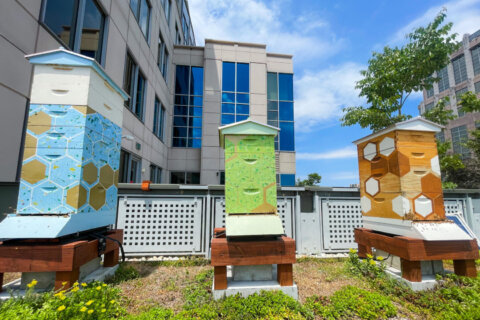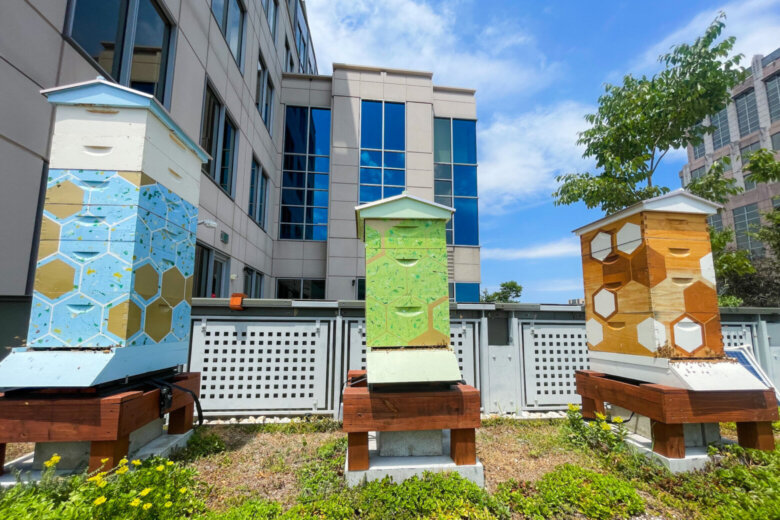
After decades of decline, the U.S. honeybee population has seen a remarkable recovery in recent years, and the growth of urban bee hive installations in unlikely places like office building rooftops is contributing to it.
In recent years, dozens of D.C. area office buildings, hospitals and school campuses have added bee hives for various reasons. Restaurants harvest their own honey, schools and corporations use them for educational programs and developers can use them to check off a box to achieve green building certification.
Durham, North Carolina-based Bee Downtown, a company that installs and maintains bee hive colonies for corporate partners, has several colonies atop buildings in the D.C. area. Choice Hotels International is Bee Downtown’s newest D.C.-area client, adding three hives with 150,000 honeybees to a terrace at its new headquarters in North Bethesda.
In some ways, urban bee colonies are better for honeybees.
“They’re not moving on the back of trucks for pollination. There is diversity of food sources for pollinators in cities because different people plant different things,” said Leigh-Kathryn Bonner, a fourth-generation beekeeper, and the 31-year-old founder of Bee Downtown.
“That also means there are longer blooming cycles for food for the bees as well. So it helps them live in these stable environments to be able to thrive.”
Honeybee hive populations generally lose about 50% of their population each year. With urban hive installations, it is typically less than 15%.
Bee Downtown operates more than 500 hives with more than 100 corporate partners along the East Coast, including large companies such as Delta Air Lines, Cisco Systems, Met Life, and fittingly, Burt’s Bees. A recent installation in D.C. was at Microsoft’s Reston, Virginia campus.
The hive installations are purposely not out of sight or out of reach for employees at the corporate office buildings where they are installed.
“They’re quite meditative for people, so people go outside and have their morning coffee by the bee hives. They’ll take meetings out by the bees. The bees become part of the culture of the organizations that we serve,” Bonner said.
Honeybee hive colonies also — obviously — produce honey. Sometimes a lot of it, and that’s an added bonus for companies and their employees who have them.
“We special bottle and label all of the honey for every partner. They can give it to employees, or give away. Some partner with local breweries for special beers for happy hours for their employees, or donate it to a food bank,” Bonner said.
In the case of Choice Hotels’ headquarters hive colony, the three hives are expected to produce about 100 pounds of honey in a matter of months. Choice plans regular honey and cheese tastings for its employees.
Get breaking news and daily headlines delivered to your email inbox by signing up here.
© 2024 WTOP. All Rights Reserved. This website is not intended for users located within the European Economic Area.









